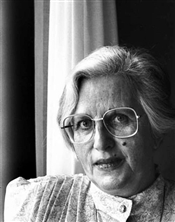Álfrún Gunnlaugsdóttir
Álfrún Gunnlaugsdóttir has earned a place among Iceland's leading authors. She has been praised by critics and received awards for her work.
 Álfrún Gunnlaugsdóttir is a writer who has generally kept a low profile in literary debate in Iceland. Nonetheless, she has won a place as one of our leading writers, and has been consistently praised by critics and received awards for her work.
Álfrún Gunnlaugsdóttir is a writer who has generally kept a low profile in literary debate in Iceland. Nonetheless, she has won a place as one of our leading writers, and has been consistently praised by critics and received awards for her work.
Álfrún started writing in middle age, and published her first book, the collection of short stories Af manna völdum/Works of Man in 1982. Prior to that time she had primarily been known as an academic: she was responsible for developing the study programme in comparative literature at the University of Iceland, after living abroad for many years, for instance in Switzerland and Spain.
Álfrún's writing is experimental and hard to categorise: she often works with the connection between memory and narrative, and how the memory, like human history, refuses to be controlled and organised. In her novels and short stories Álfrún's narrators are often looking back, filling in the gaps, and seeking to link together fragments of memory to create a consistent picture or story.
Álfrún grew up during World War II, when Reykjavík was occupied by British and US military forces. Political conflict, war, and man's responsibility to himself comprise a leitmotif in her work. Her narratives have an autobiographical tone, when she describes the fear experienced by an islander at the end of the world, when the representatives of a faraway armed conflict suddenly appear on the doorstep. Álfrún lived in Spain when it was under Fascist rule, and thus she knows first-hand the effect on the individual of a culture of violence and oppression. Álfrún's work is not limited to Iceland: she confidently moves all over the world, and from one historical event to another. She is a writer with an excellent command of the many different forms of literature. She never spoon-feeds the reader, who is compelled to make the effort to grasp the complexity of the narrative, with its multiple viewpoints, and changes from past to present and back again.
Álfrún won the DV Literary Award in 1985 for Þel (1984). She has been nominated three times for the Nordic Council Literary Award, for Hringsól/Circle (1987), Hvatt að rúnum/Rune Chant (1993) and Yfir Ebrofljótið/Across the Ebro River (2001). Her latest book, Rán (2008), was nominated for the Icelandic Literary Award in 2008 and for Rán she received both the DV Cultural Awards and the Fjöruverðlaun.
